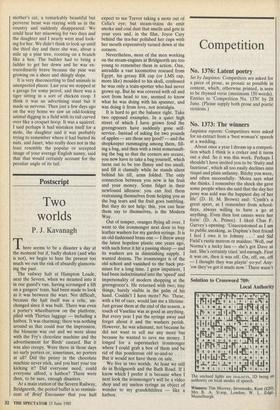Postscript
Two worlds
P. J. Kavanagh
There seems to be a disaster a day at the moment but if, badly shaken (and who is not), we begin to hate the present too much we run the risk of absurdly glamoris- ing the past.
The railway halt at Hampton Loade, near the Severn, when we steamed into it in our guard's van, having scrounged a lift on a gangers' train, had been made to look as it was between the wars. Not difficult, because the halt itself was a relic, un- changed since it was built. There was even a porter's wheelbarrow on the platform, piled with Thirties luggage — including a hatbox. It was charming; there was nothing around us that could mar the impression, the blossom was out and we were alone with the Fry's chocolate machine and the advertisement for Birds' custard. But it was also creepy. Were there in those days no surly porters or, sometimes, no porters at all? Did the penny in the chocolate machine never stick, and you hurt your toe kicking it? Did everyone need, could everyone afford, a hatbox? There were then, to be sure, enough disasters.
At a main station of the Severn Railway, Bridgnorth, the period buffet is so reminis- cent of Brief Encounter that you half
expect to see Trevor taking a mote out of Celia's eye; but steam-trains do emit smoke and coal dust that smells and gets in your eyes and, in the film, Joyce Cary behind the tea-bar polished her cups with her mouth expressively turned down at the corners.
Nevertheless, most of the men working on the steam-engines at Bridgnorth are too young to remember them in action. One, astraddle a vast locomotive rescued from Egypt, his greasy BR cap (or LMS cap, more like) moulded to his skull, confessed he was only a train-spotter who had never grown up. But he was covered with oil and soot from head to toe, seemed to know what he was doing with his spanner, and was doing it from love, not nostalgia.
It is hard to get the balance right. Take two opposed examples. In a quiet high street of which I have grown fond the greengrocers have suddenly gone self- service. Instead of asking for two pounds of apples — are those any good? — and the shopkeeper rummaging among them, fill- ing a bag, and then with a twist somersault- ing the bag so that the corners are secure, you now have to take a bag yourself, which turns out to be too flimsy and too small, and fill it clumsily while he stands silent behind his till, arms folded. The only connection between you now is his fruit and your money. Some fidget in their newfound idleness: you can feel them restraining themselves from helping you as the bag tears and the fruit goes tumbling. But they do not help: this, you can hear them say to themselves, is the Modern Way.
Out of temper, oranges flying all over, I went to the ironmonger next door to buy leather washers for my garden syringe. It is an old-fashioned brass one — I threw away the latest hopeless plastic one years ago, with such force it hit a passing sheep — and its washers are in diminishing supply. I wanted dozens. The ironmonger is of the old school and vanished to the back pre- mises for a long time. I grew impatient, I had been indoctrinated into the 'speed' and impersonality of modern shopping at the greengrocer's. He returned with two; tiny things, barely visible in the palm of his hand. Couldn't I have more? No. These, with a bit of care, would last me a lifetime.
Just grease them at the end of the season, a touch of Vaseline was as good as anything. But every year I put the syringe away and forget about it and the washers perish.
However, he was adamant, not because he did not want to sell me any more but because he wanted to save me money. I longed for a supermarket ironmonger where I could grab a box of them and be rid of this ponderous old so-and-so . . . . But it would not have them on sale.
We live in two worlds. At least we still do in Bridgnorth and the Bath Road. If I know which I prefer it is because when I next look the ironmonger's will be a video shop and my useless syringe an object of wonder to my grandchildren — like a hatbox.


















































 Previous page
Previous page